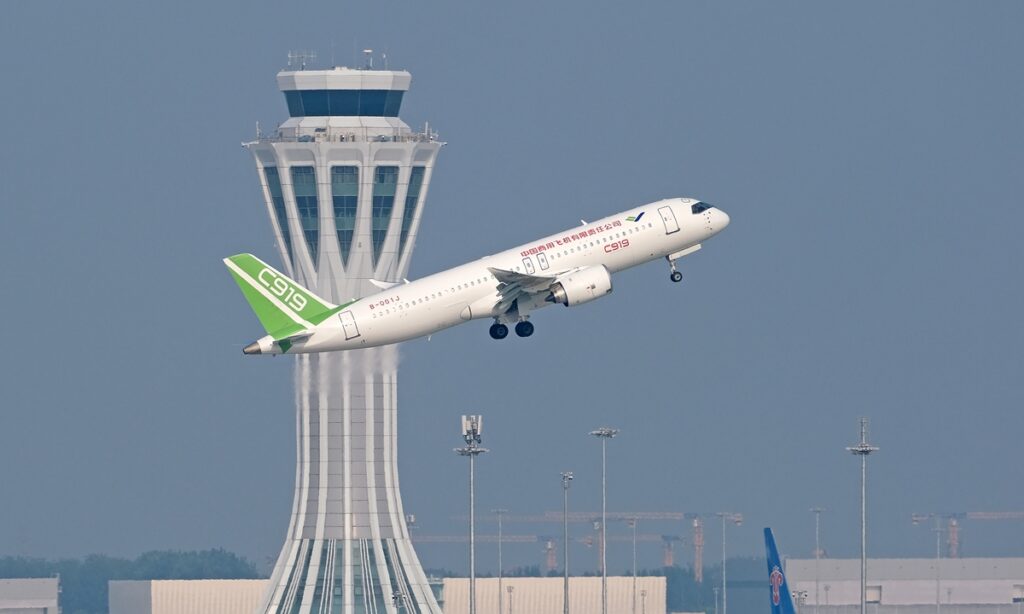Journey to the sky
Whether it be the muyuan (lit: wood kite) invented by the ancient Chinese in the Spring and Autumn Period (770BC-476BC) or the Wright Brothers’ masterpiece aircraft invented over 100 years ago, human beings’ fascination with taking to the sky has been a universal phenomenon parallel with the world’s evolving development in the aviation industry.
Human Wings, a recently released Chinese docuseries, visualizes this human longing to fly through a brief narrative of world development history in civil aviation. Among many of the industry’s traditional forerunners like the Europe and the US, China has emerged as a new powerhouse that fulfilled its “giant jet” dream and will continue to provide the global industry with new designs and technologies.
An acute focus on China’s domestic commercial aircraft manufacturing as the central focus notwithstanding, the documentary has an expansive worldview, to which director Cheng Yueping told the Global Times that his team has traveled to countries significant to the world’s aviation industry history like Russia, the US, Japan and Canada.
‘Blue Sky Dreams’
The documentary weaves a tapestry of history through experts’ interviews and footage of aviation relics which only helps visually enhance the docuseries’ storytelling over its five-episode arch.
From the docuseries’ first episode, Blue Sky Dreams to its finale Questioning the Sky, the five episodes chart a timeline for audiences tracing the journey from to the invention of commercial aircraft and the industry growth’s economic value and global competitions, to the improvement of regulations and training systems and how the civil aviation industry safeguards passenger security.
“We looked into the key examples showcasing the design, manufacture and operation of commercial aircraft worldwide. We hoped that this would reveal the basic laws of commercial aircraft development to inspire China’s development in the field,” Cheng noted.
In first episode Blue Sky Dreams, Chinese pioneer Feng Ru’s story is highlighted. Dubbed as the “Father of Chinese aviation,” Feng manufactured the first airplane for China in the US in 1909. He was later dubbed the “oriental Wright” by the media at the time. The plane only flew a mere 805 meters, a milestone nonetheless for China’s aviation history.
Despite living in New York for a long time, Feng still chose to return to his home country after the Revolution of 1911 with two airplanes inventions under his belt. “Succeed, or die” was Feng’s motto, of which young aviator Liu Xiaojiang told the Global Times that the “extreme sounding saying is a basic standard that aviators should prepare themselves for before choosing to dive into the career.”

Promotional material for Human Wings Photo: Courtesy of Cheng Yueping
“Courage, tenacity and loyalty to the country and its people are also part of the Chinese aviators’ spirit,” the 31-year-old insider said.
Machines have no intrinsic value outside of their utility to humanity. The episode Vertical Sky and Horizontal Land highlights how aviation workers go about their jobs in different sections of the industrial chain such as maintenance, security check, as well as the important yet easily ignored behind-the-scenes training system.
Without a well-trained contingent of flight crews onboard commercial airlines, the “miracle” of China’s civil aviation history would otherwise be impossible.
In 2018, chief pilot Liu Chuanjian of Sichuan Airlines’ 3U8633 flight saved 119 people’s lives by maneuvering a severely damaged and malfunctioned airplane through an alternative route, landing safely in Chengdu. The airplane was supposed to fly from Chongqing to Lhasa, Southwest China’s Xizang Autonomous Region. Civil aviation industry insider Liao Jieqi told the Global Times that aside from the pilot being experienced, the “seamless cooperation of different supporting units in Chinese civil aviation” made the incident an exemplar to global aviation emergency management.
“Any failings or weakness may become an Achilles’ heel,” Cheng said.
Innovative potential
Bound tightly to a country’s economy and technological development, the aviation industry is often valued for its strategic importance to a country within which “giant jet” innovation becomes a key national priority, as has been the case in China.
The final episode Questioning the Sky documents the drivers behind China’s “big jet” innovation with the classic example of the C919.
Innovated and developed by aircraft manufacturer the Commercial Aircraft Corporation of China (COMAC), the C919 is the country’s first-ever domestically produced jumbo “giant jet” with a capacity of 190 passengers.
In May 2023, the large domestic aircraft had its inaugural commercial flight. Traveling the Chengdu-Shanghai regularly and Shanghai-Beijing route for its maiden flight, the aircraft has demonstrated China’s innovative potential to challenge currently the Western-dominated aviation industry characterized by plane modes like the Boeing 737 MAX and the Airbus A320.
“The C919 has enhanced the competitiveness and international influence of China’s entire civil aviation industry on the global stage,” Liao told the Global Times, adding that it’s domestically produced aircraft can also allow Chinese passengers to “always feel safe and close to home.”
“Generations of Chinese aviators have put their efforts into this great career. There will forever be a rivalry between human beings and the sky,” Cheng noted.
(Global Times)




